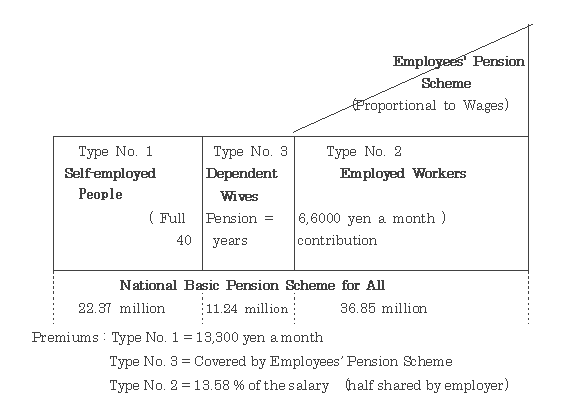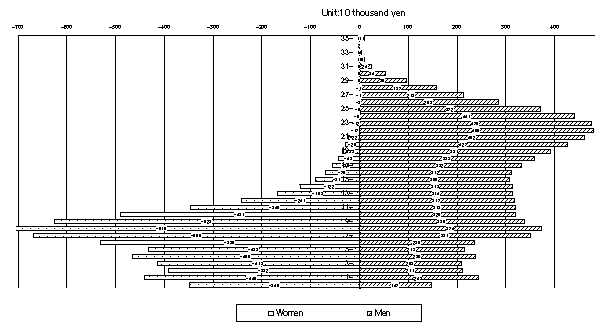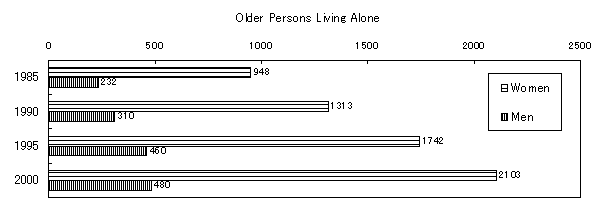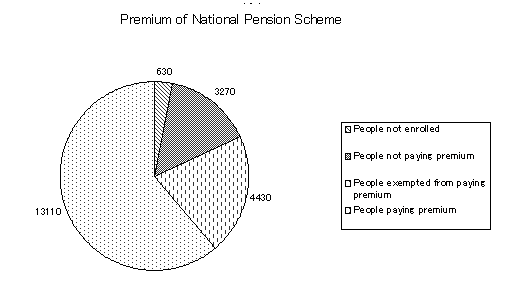| The Issues
on Pension Systems
The Government says that there
are several problems in the pension systems in Japan.
(1) As Japan is developing into an ageing society very fast, the pension
systems are not sustainable as they are. To maintain the benefits level, workers and employers must
pay higher and higher premiums, so the balance between the benefits
and premiums must be adjusted.
(2) Recently people, especially women, have many choices of the life-styles.
The pension system must stand neutral in choosing the life-styles.
(3) Recently people, especially young people, do not trust pension systems.
It is important to restore people's confidence in pension
systems.
Pension Systems in Japan
Before I go into the issue of
pension reform, I want to give you a general idea about the pension
systems in Japan. Japan
has a double deckered public pension system consisting of the
national basic pension scheme common for all and the employees'
pension scheme as additional pension for employed workers. The
Figure on the next page shows how the pension systems in Japan
are and how many people are enrolled in them.

The Issues on Pension Systems
The Government says that there
are several problems in the pension systems in Japan.
(1) As Japan is developing into an ageing society very fast, the pension
systems are not sustainable as they are. To maintain the benefits level, workers and employers must
pay higher and higher premiums, so the balance between the benefits
and premiums must be adjusted.
(2) Recently people, especially women, have many choices of the life-styles.
The pension system must stand neutral in choosing the life-styles.
(3) Recently people, especially young people, do not trust pension systems.
It is important to restore people's confidence in pension
systems.
Japan Pensioners' Union maintains
that the real problems of the pension systems in Japan are as
follows.
(1) Forty- seven percent of the people in Japan are expected to receive
only national basic pension benefits in their old age. The average amount of the basic pension
benefits is 46 thousand yen.
This is hardly enough to support their lives.
In addition, 620 thousand people of age 65 and over have
no pension at all.
(2) The gender gap in pension benefits is very large. In employees pension benefits, the average
amount for men is around 190 thousand yen.
While, the average amount for women is around 110 thousand
yen. As women are likely to live alone four
times as much as men, this is a serious problem.
(See the figure.)


(3) The pension systems are getting "hollow" inside. The premium for the national basic pension
is so high that the people who cannot pay the premium are increasing
year by year. The
figure shows the situation.

Pension Reform in Japan
The
issues of pension reform have been the major political and social
issues for several years.
The discussion was not enough but the Government submitted
the pension reform bills to the regular session 159 this year
and rammed them through the Diet. According to the public opinion polls, however, as much as
70 percent of the people do not value the reform and still are
against it. Japan Pensioners' Union consider the reform
the worst option, because it brings the heavier burden to the
working people.
The Points of the Reform are as
follows.
(1) Premiums for employees’ pension scheme as well as for national basic
pension scheme will be raised yearly until 2017, when the rate
of the premiums will be fixed (except price and wage adjustment).
(2) The benefits will decrease
automatically according to the drop of the work force and the
rise of life span. The
government says that the benefits of the model family will not
be less than 50 percent of the average male wages. In
the interpellation, it became clear that only a few families will
apply to the model and the benefits will drop below 50 percent
after the benefits amount is decided. As the years go by, the
gap between the wage and the pension will get larger.
(3) Concerning women's pension, much has been discussed on whether collecting
premiums from wives or not and on whether part-time workers should
be admitted to the employees’ pension scheme. These issues were not included in the recent reform bill.
Japan Pensioners' Union maintains
that the pension reform problematic in the following respects.
(1) Raising premiums will accelerate
the pension systems becoming hollow inside, increasing the people
who cannot pay premiums because of the poor income.
The pension reform will increase the small corporations,
which will withdraw from employees’ pension scheme as well as
the number of the workers who will be expelled from employees’
pension scheme because of the dismissal and the unstable employment.
(2) Not only employees' pension
but also national basic pension, which is very low as it is, will
be cut down. The balance between premiums and benefits
in this pension reform is assumed on the trial calculation based
on the decrease of birthrate, the decrease of work force, rising
of wage and price, but the trial calculation is not certain and
may differ on a large scale, in which case the pension benefits
may not be secured.
(3) Raising the rate of funding by national treasury from the current
one-third of the national basic pension to one-half is postponed,
and it will hasten the deterioration of pension funding.
Savings of pension premiums have been used on building
unnecessary facilities and hazardous investment on stocks.
Savings of pension premiums should be used to improve pension
systems.
(4) The serious issue of older people who have no pension at all or only
a small pension benefits have been left out. The gender gap of pension benefits is extremely large. The pension reform has not given any answers
for these issues.
Conclusion
The government should guarantee
"the right of everyone to social security" as provided
in the International Covenant on Economic, Social and Cultural
Rights, by reforming the pension systems for the better.
The UN Committee on Economic, Social and Cultural Rights
recommended to the Japanese Government that the Japanese Government
should "incorporate a minimum pension into the national pension
system" and also "the persisting de facto gender inequality
in the pension system be remedied to the maximum possible extent"
in its concluding observations in 2001. Japan Pensioners' Union strongly demands
that the government should observe these recommendations. Japan
Pensioners' Union considers that the Government should withdraw
the pension reform and make a fresh start on building up a minimum
pension system funded by national treasury, which will secure
every older person's life. |



